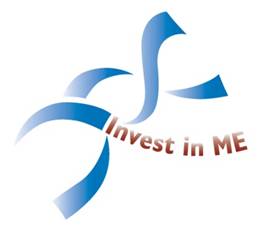Invest in ME Research
Invest in ME Research (Invest in ME or IIMER) is an independent UK charity founded by parents of patients, that campaigns for biomedical research into myalgic encephalomyelitis.[1] It is a supporter of the All-Party Parliamentary Group on Myalgic Encephalomyelitis but declined to join the UK CFS/ME Research Collaborative.[2]
Aims[edit | edit source]
Invest in ME Research provides funding, education and awareness of the disease.
International conferences[edit | edit source]
IiMER organizes and hosts hosts international colloquiums and conferences, see Invest in ME Conference.
Funding[edit | edit source]
Invest in ME Research do not receive any government funding. Let's do it for ME, a patient-run group, fundraises solely for Invest in ME Research.
Centre of Excellence for ME[edit | edit source]
Invest in ME Research is currently fundraising to establish an UK and Europe Centre of Excellence for ME.[3] The Let's C Research appeal supported by Let's Do It for ME is fundraising for centre of excellence.[4]
Notable people[edit | edit source]
- Richard Simpson
- Pia Simpson
- Professor Malcolm Hooper
Invest in ME Research Scientific Advisory Board[edit | edit source]
- Dr Jo Cambridge, University College London
- Professor Simon Carding, Quadram Institute Bioscience
- Professor Anne Cooke, University of Cambridge
- Professor Jonathan Edwards, University College London
- Dr Ian Gibson, University of East Anglia
- Professor Angela Vincent, University of Oxford
- Professor Tom Wileman, University of East Anglia[5]
Studies funded[edit | edit source]
UK Rituximab Trial[edit | edit source]
UK Gut Microbiota Project[edit | edit source]
- Led by Professor Simon Carding of the Quandram Institute/University of East Anglia, with Dr Amolak Bansal.[6]
Defining autoimmune aspects of myalgic encephalomyelitis/chronic fatigue syndrome (ME/CFS)[edit | edit source]
- A PhD project investing the autoimmune hypothesis.[7]
Notable studies published[edit | edit source]
- 2016, Extended B cell phenotype in patients with Myalgic Encephalomyelitis/Chronic Fatigue Syndrome: A cross-sectional study[8] (Full Text)
History[edit | edit source]
- 2005, Invest in ME Research founded, originally under the name Invest in ME.
- 2006, first Invest in ME Research International ME Conference
- 2006, charitable trust status
- 2007, Journal of Invest in ME launched[9]
Online presence[edit | edit source]
Contact details[edit | edit source]
- Address: PO Box 561, Eastleigh, Hampshire, SO50 0GQ
- Phone: 02380 643736 / 07759 349743
Learn more[edit | edit source]
See also[edit | edit source]
- Invest in ME International ME Conference
- Centre of Excellence for ME
- Biomedical Research into ME Colloquium
- European ME Alliance
- Let's do it for ME
- Jon Campling (actor)
References[edit | edit source]
- ↑ Invest in ME - About us
- ↑ "Redirect". Invest in ME Research. Retrieved August 2, 2019.
- ↑ Invest in ME Research. "UK Charity for Myalgic Encephalomyelitis Centre of Excellence for ME". investinme.org. Retrieved January 28, 2019.
- ↑ Let's Do It for ME. "Let's C Research | Read Fundraising's story". justgiving.com. Retrieved January 28, 2019.
- ↑ Invest in ME Research. "Scientific Advisory Board". investinme.org. Retrieved February 15, 2019.
- ↑ http://investinme.org/ce-gm-foundation.shtml
- ↑ http://investinme.org/ce-gm-phd2.shtml
- ↑ Mensah, Fane; Bansal, Amolak; Berkovitz, Saul; Sharma, Arti; Reddy, Venkat; Leandro, Maria; Cambridge, Geraldine (2016), "Extended B cell phenotype in patients with Myalgic Encephalomyelitis/Chronic Fatigue Syndrome: A cross-sectional study", Clinical and Experimental Immunology, 184 (2): 237-247, doi:10.1111/cei.12749
- ↑ Invest in ME Research. "History". Invest in ME Research. Retrieved January 28, 2019.


